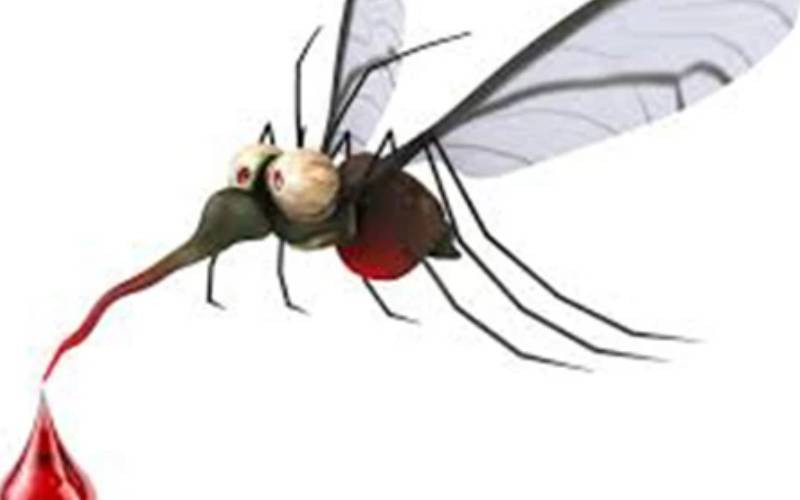By Joyce Gathu
Due to challenges of garbage disposal in urban centres, many people keep waste in their houses pending collection.

The refuse bag in our kitchen is not only an eyesore but is turning into a dangerous health menace [Photo: Joyce Gathu]
The arrangement with the garbage collectors is to fetch the waste once or twice a week. By this time, the refuse has started decomposing and emitting bad odour.For now, forget the smell, which has serious health implication and focus on the potential danger.
Many households find it easier to store the waste papers mostly made of polythene paper in the kitchen, where most garbage is generated.
"During food preparation, people tend to constantly touch the rim of the waste paper when disposing peels, matchsticks and other wastes," Mary Wambui, a community health worker explains.
She adds: " While in the kitchen we tend to move from the fridge, to the bin and then to stirring food on the stove. Often many people forget to rinse their hands," notes Wambui.
Adding that: "At times we may also be simultaneously handling other equipment around the house such as the television remote control, door handles or even worse, feeding children."
This scenario could be one of the explanations as to why many people suffer from frequent diarrhoea.
Dr Ken Odongo, a physician in Nairobi says: "Household waste that is not properly managed, creates unhygienic conditions that attract rats and cockroaches. It is also a breeding site for flies, which easily spread diseases."
Dr Odongo says this constant interaction with germs predisposes people to health problems such as stomach irritation that causes vomiting and diarrhoea.
The sad reality is that, many people underestimate the impact of diarrhoea and vomiting on their health and quality of life.
Yet, as Dr Odongo cautions, the physical stress from vomiting can cause the lining of the oesophagus to tear, leading to massive bleeding.
Oesophagus is the long tube that connects the mouth to the stomach and allows food to pass through.
"There are cases where the oesophagus raptures or break and this can be fatal if immediate surgery is not performed," warns Dr Odongo.
And that is not all vomiting can do as Dr Dennis Okao explain. Frequent vomiting causes gastritis — an inflammation of the stomach lining.
"If left untreated, gastritis can lead to a severe loss in blood or in some cases increase the risk of developing stomach cancer," says Dr Okao.
During incidences of diarrhoea and vomiting, there is loss of fluid and crucial electrolytes from the body.
"The balance of the electrolytes in our bodies is crucial if our cells and organs are to function properly.
The electrolytes found in our blood include sodium, potassium and chloride.
However, the medic explains, a decrease in potassium for instance, can significantly affect the nervous system and can lead to irregular heartbeats. Extreme, irregular heartbeats can be fatal.
Also a person, who is in a constant state of dehydration and low potassium levels, can suffer from kidney stones or worse kidney failure.
The loss of body acids due to frequent vomiting and diarrhoea can lead to general body weakness, fatigue and constipation. At times the stool becomes bloody.
Currently, diarrhoea is one of the leading children killer in Kenya.
According to the United Nation Children Education Fund in Kenya, the average mortality for those aged under five is about 77 deaths per 1,000 live births, it is however staggering in urban slums at 151 per 1,000 live births.
This situation has been blamed on poor sanitation and hygiene.
Apart from the refuse in the house, there is litter in the compound and it forms a perfect breeding site for mosquitoes during the rainy season.
Dr Odongo says that during the dry seasons, stagnant waters also encourage mosquitoes to thrive.
A bite from a parasite infected mosquito causes malaria.
Since waste is a part of our lives be it at home or work, the manner in which we dispose it, can mean the difference between sickness or health.
"People need to understand that it is not only garbage found outside their homes that can result in health problems, but also the one in the house," says Nancy Wafula.
Various studies have shown that improved hygiene at home prevents many deadly diseases.
Health experts advise people to keep a clean garbage bin. One should wrap the garbage properly with a polythene bag before throwing into the bin.
Most importantly, ensure you wash your hands every time you come into contact with the bin.
This will translate into a healthy and safe meal for the family and keep diseases at bay.
 The Standard Group Plc is a multi-media organization with investments in media
platforms spanning newspaper print
operations, television, radio broadcasting, digital and online services. The
Standard Group is recognized as a
leading multi-media house in Kenya with a key influence in matters of national
and international interest.
The Standard Group Plc is a multi-media organization with investments in media
platforms spanning newspaper print
operations, television, radio broadcasting, digital and online services. The
Standard Group is recognized as a
leading multi-media house in Kenya with a key influence in matters of national
and international interest.











